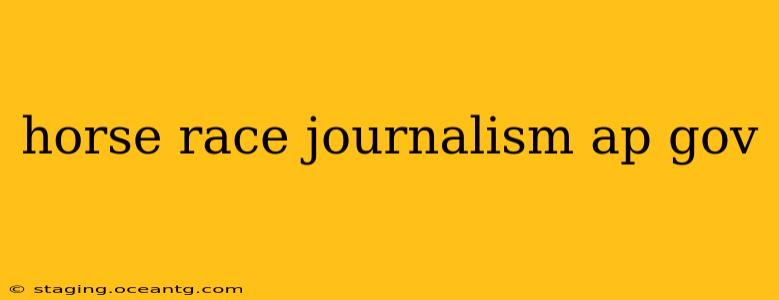American politics, particularly during election seasons, often feels like a horse race. This isn't a literal observation, but rather a commentary on the prevalent style of election coverage known as horse race journalism. This type of reporting focuses less on the candidates' policy positions and more on their relative standing in the polls, campaign strategies, and the drama of the electoral contest. While seemingly harmless, horse race journalism has significant consequences for the public understanding of the political process and the candidates themselves. This article will dissect this prevalent reporting style, exploring its strengths, weaknesses, and ultimately, its impact on the democratic process within the context of AP Government curricula.
What is Horse Race Journalism?
Horse race journalism prioritizes the "game" of the election over substantive issues. Instead of deeply examining a candidate's platform on healthcare, education, or foreign policy, the focus shifts to polling numbers, campaign fundraising, and the ebb and flow of public opinion. Think of it like watching a horse race: the emphasis is on who's leading, who's falling behind, and the strategies each horse (candidate) is using to win. This often manifests as constant updates on poll numbers, analyses of campaign ads, and speculation about potential upsets or momentum shifts.
Why is Horse Race Journalism So Prevalent?
Several factors contribute to the dominance of horse race journalism. First, it's easier to report. Polling data is readily available, and analyzing campaign strategies often involves simply observing public statements and actions. In contrast, thoroughly researching and explaining complex policy proposals requires significant time, effort, and expertise.
Second, horse race journalism is often more engaging for the audience. The competitive nature of elections lends itself to a narrative of winners and losers, which is inherently captivating. This can lead to higher viewership and readership, providing media outlets with an incentive to prioritize this style of reporting.
Finally, the 24/7 news cycle plays a crucial role. With constant pressure to produce new content, the immediacy of poll updates and campaign events makes horse race reporting a readily available and easy-to-digest option for news organizations.
Does Horse Race Journalism Serve the Public Good?
While horse race journalism can be entertaining and informative in some ways – providing insights into campaign dynamics – it ultimately falls short in its primary responsibility: informing the electorate. The constant focus on strategy and polls overshadows the substantive issues that truly shape the political landscape. This can lead to several problems:
H2: Does Horse Race Journalism Undermine Policy Debates?
Absolutely. By focusing on who's winning rather than what they stand for, horse race journalism can stifle substantive policy debates. The public receives less information about the candidates' positions on vital issues, hindering informed voting. The emphasis shifts from informed decision-making to choosing the perceived "winner."
H2: Does Horse Race Journalism Encourage Negative Campaigning?
Yes, horse race journalism can unintentionally encourage negative campaigning. When the focus is solely on winning, the incentive to attack opponents and employ divisive rhetoric increases. This contributes to a more polarized and less civil political discourse.
H2: How Does Horse Race Journalism Affect Voter Turnout?
The impact on voter turnout is complex. While some argue that the excitement generated by horse race coverage might increase interest, others contend that it can discourage participation. If voters feel that the election is primarily about who's "ahead" rather than about substantive issues, they may feel their vote doesn't matter, leading to apathy and lower turnout.
Moving Beyond the Horse Race: A Call for Substantive Reporting
To improve the quality of election coverage and better serve the public, a shift away from horse race journalism is crucial. Journalists should prioritize in-depth reporting on policy positions, fact-checking claims made by candidates, and analyzing the implications of different political platforms. This requires a commitment to investigative journalism, fact-checking, and balanced reporting that goes beyond the superficial aspects of the electoral contest. Ultimately, robust and insightful reporting is essential for an informed electorate capable of making sound choices in a democratic society. Instructors of AP Government should emphasize media literacy and critical consumption of news, teaching students to identify horse race journalism and seek out more substantive sources of information.
